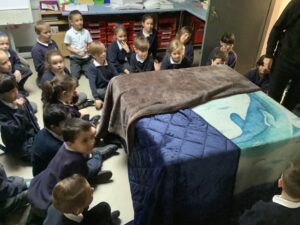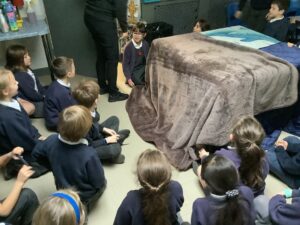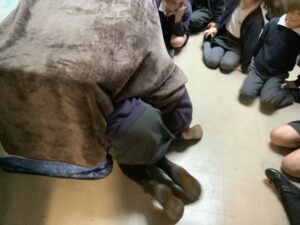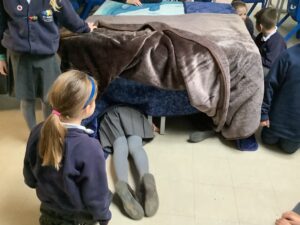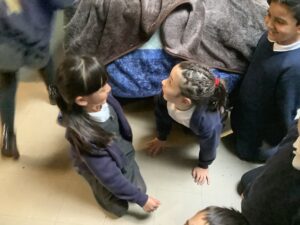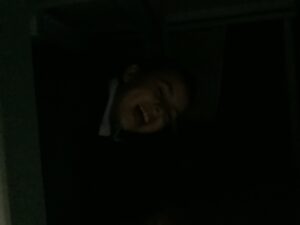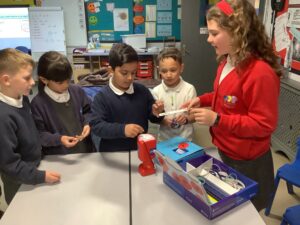This week’s post comes from Mr Wilks, the Sphere Federation Leader for Science and foundation subjects…
What do we mean by topics?
Topics are the vehicle for delivering much of the learning in the foundation subjects (eg History, Art, Geography, Design and Technology). Each half-termly topic has a driving subject – the main focus for teaching pupils the knowledge and skills they need to succeed in life. The driver changes with each topic to ensure a broad and balanced curriculum.
Although the learning in each topic will be provided by the driving subject, there are opportunities for enrichment through other subjects. For example, learning in an art topic may be enriched by geography learning about where an artist was born and lived.
Read more about the intent, implementation and impact of our topics.
What is this half-term’s topic?
This half-term, we’re artists and will be developing our art knowledge and skills.
The learning this half-term has two aspects to it. The first is art history where children will learn about specific artists and their work. The other is the art process where children will practise and develop skills by creating art.
Each phase has age-related specific knowledge, skills and vocabulary that they’ll learn, use and apply across the topic.
Years 1 and 2
Children have two featured artists: Leonardo Da Vinci and Paul Klee. They’ll compare their art, talking about similarities and differences. They’ll discuss what they like and dislike about the art and how it makes them feel. They’ll also learn about the artists’ lives and where in the world they lived.
Ask your child what is the same and what is different about the Mona Lisa (da Vinci) and Senecio (Klee).
In practical art lessons, children will be honing their artistic skills and knowledge by sketching objects using pencil, learning about and mixing colour and then they’ll be learning how to print by creating relief prints inspired by the artwork they’ve studied.
Years 3 and 4
Children will learn about the work of Wassily Kandinsky and Martha McDonald Napaltjarri. They’ll compare and contrast artworks by these artists and also learn about their lives and the places they lived. In particular, children will learn about abstract and figurative art (see the vocabulary for definitions of these words).
Ask your children what they can see in these images: Composition VIII (Kandinsky) and Warlukuritji (Napaltjarri).
In practical art sessions, children will develop observational drawing skills, and develop their understanding of colour by learning about warm, cold and complementary colours. They’ll then apply what they’ve learnt by creating some mixed media collages inspired by the artists they’ve studied.
Years 5 and 6
Children are learning about sculpture in their art lessons and will focus on three artists: Barbara Hepworth, Henry Moore (both local artists) and Thomas J Price. The children have already been on their school trip to the Yorkshire Sculpture Park last week where they’ve seen and learned about sculptures by these artists.
Ask your child describe the art work of each artist and then do an internet search of their work to carry on the discussion.
In art history lessons, they learn about the lives of these artists and how their localities have influenced their art. They’ll learn about classical and modern art in relation to their featured artists and in art movements more generally. They’ll also learn when and why the modern art movement happened.
In practical art lessons, children will develop their observational skills and will creating maquettes (see the vocabulary list) inspired by the work of Barbara Hepworth.
How can you help?
Talk to your child about what they’ve been learning in class. The class news page of our website is a good place to go to find out more.
Familiarise yourself with the artists and the art work that your child is learning about. Look in books or on the internet for pieces by the artists and talk about them. Find art by other artists that you like and compare it to the featured artists. If you feel confident, you can go into more depth using age-related expectations and the vocabulary. However, if not, leave that to the teachers and just enjoy looking at the pieces and asking general questions:
- What do you like or dislike about the art?
- How does the art make you feel?
- Is it life-like or not?
- What colours can you see?
The Leeds Art Gallery and Henry Moore Institute are both free to enter and if your child has already visited during a trip, they can be the tour guide and show you around!
Finally this week, two reminders…
Next week is Anti-Bullying Week. This year’s theme is ‘One Kind Word’ and we will be taking part in Odd Socks Day on Monday. Odd Socks Day is to raise awareness of our differences, individuality and personal choice. Your child (and you!) can come to school wearing odd socks to celebrate what makes them unique.
And next Friday is Children in Need day. This is a non-uniform day. Your child is invited to come to school in non-uniform and make a donation to the charity.
Have a good weekend!
